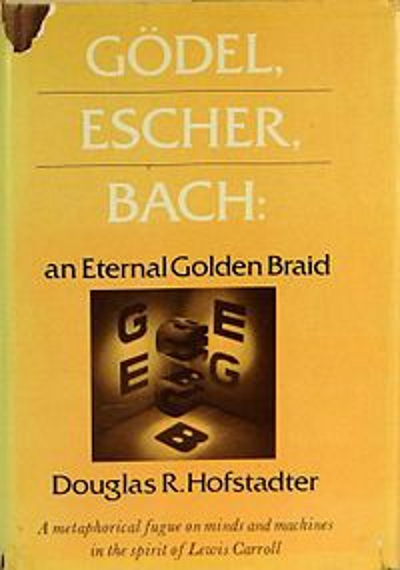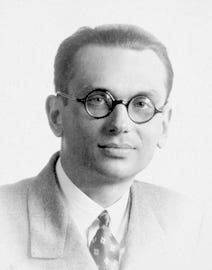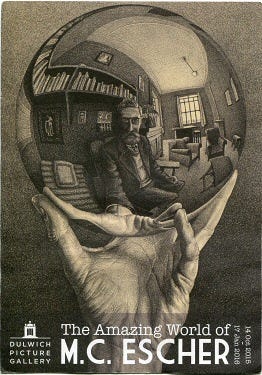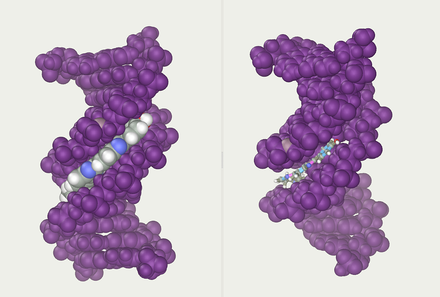Before You Read Gödel, Escher, Bach
 From Wikipedia Gödel, Escher, Bach is one of those books that can truly expand your mind, but it is quite dense and besides long, so it is no storm that the internet is entire of people lamenting that they never actually finished it. Hofstadter has a way of writing, where he assumes that you already are conversant with a batch about what he is talking about, so it doesn ’ triiodothyronine hurt to go in well prepared .
From Wikipedia Gödel, Escher, Bach is one of those books that can truly expand your mind, but it is quite dense and besides long, so it is no storm that the internet is entire of people lamenting that they never actually finished it. Hofstadter has a way of writing, where he assumes that you already are conversant with a batch about what he is talking about, so it doesn ’ triiodothyronine hurt to go in well prepared .
Motivation
This book is many things, but I think that one utilitarian way of thinking about it is as a rebutter to the 1961 wallpaper Minds, Machines and Gödel by J.R. Lucas. In this paper Lucas discusses AI and the differences between humans and computers, using logician Kurt Gödels incompleteness theorem. Lucas comes to the ending that there are some things that are uniquely homo, things that a computer can never do. now, this discussion is older than the beginning computer, that humans are unique and that “ real ” AI is doomed to fail. But how would we know ? There are certain things that computers can not do today, but international relations and security network ’ triiodothyronine it a bite assumptive to assume that they never will be able to ? What Lucas is in truth after is mathematical proof that because of the way computers work, they are not able to solve certain problems that humans can solve. He thinks that he has found such proof in Gödel ‘s incompleteness theorem.
Reading: Before You Read Gödel, Escher, Bach
nowadays, Hofstadter does not agree, but he finds the argument interesting, and in his koran he intends to dig deeper into what it means to think, the nature of proof, truth, and what is knowable, and possibly find a direction how to proceed to build a veridical AI. In the process, he besides discusses music, the philosophy of mathematics, recursion, physics, DNA, art, Zen Buddhism, and many other things that sake him. The book reads about like a stream of awareness where Hofstadter freely wanders between subjects and presents us with a virtual smorgasbord of fantastic ideas. If you are not familiar with these ideas beforehand, reading the book can seem like a daunting undertaking. Below I will present a few Wikipedia articles that you can read before tackling the koran .
Gödel and the philosophy of mathematics

 From Wikipedia I think the right context for Gödel is in the doctrine of mathematics. This harks back a far as Plato and Pythagoras. Plato noticed that mathematics seemed to be uniquely suited as a way to achieve certainty. But how do we know that a mathematical proof is decline ? How do we gain cognition about mathematical objects such as natural numbers ? hypertext transfer protocol : //www.wikiwand.com/en/Philosophy of mathematics At the lapp time philosopher Zeno was asking questions about the nature of eternity : These questions came into focus again in the 1800s, when a batch of people started to worry about the foundations of mathematics. Among these were Frege and a bit belated Russell, who tried to put mathematics on a firm grounding using logic. This turned out to be very hard and prone to paradoxes and inconsistencies. Cantor ‘s ideas about eternity seemed paradoxical to many. Hilbert besides started a course of study to put mathematics on firm labor. This was complicated when Gödel found out that there are limitations to what can be proven, and that an expressive mathematical system can never prove itself to be coherent. shortly thereafter, Turing, Church, and Tarski proved like things.
From Wikipedia I think the right context for Gödel is in the doctrine of mathematics. This harks back a far as Plato and Pythagoras. Plato noticed that mathematics seemed to be uniquely suited as a way to achieve certainty. But how do we know that a mathematical proof is decline ? How do we gain cognition about mathematical objects such as natural numbers ? hypertext transfer protocol : //www.wikiwand.com/en/Philosophy of mathematics At the lapp time philosopher Zeno was asking questions about the nature of eternity : These questions came into focus again in the 1800s, when a batch of people started to worry about the foundations of mathematics. Among these were Frege and a bit belated Russell, who tried to put mathematics on a firm grounding using logic. This turned out to be very hard and prone to paradoxes and inconsistencies. Cantor ‘s ideas about eternity seemed paradoxical to many. Hilbert besides started a course of study to put mathematics on firm labor. This was complicated when Gödel found out that there are limitations to what can be proven, and that an expressive mathematical system can never prove itself to be coherent. shortly thereafter, Turing, Church, and Tarski proved like things.
Read more: The 36 Best (Old) Books We Read in 2021
Logic and proofs

 From Wikipedia When is something coherent ? What is even logic ? When can something be said to be proven ?
From Wikipedia When is something coherent ? What is even logic ? When can something be said to be proven ?
Bach and fugues

 From Wikipedia Hofstadter is a music lover and lets himself be inspired by music when he structures his reserve and the dialogs in it. Especially Bach ‘s music seems to resonate with him, and he makes changeless references to it. I would recommend going to Youtube or Spotify and listen to some of Bach ‘s fugues and canons. Bach ‘s music is matter to because it is very rulebound, sol for example, one technique he employs in creating is to take a melody, turn it inverted, or play it back. There are many like rules, and in some of the dialogs, Hofstadter uses the lapp rules but translated from music into literature. musician John Cage is besides discussed as sort of the antithesis or complement of Bach ( in a positive way ) .
From Wikipedia Hofstadter is a music lover and lets himself be inspired by music when he structures his reserve and the dialogs in it. Especially Bach ‘s music seems to resonate with him, and he makes changeless references to it. I would recommend going to Youtube or Spotify and listen to some of Bach ‘s fugues and canons. Bach ‘s music is matter to because it is very rulebound, sol for example, one technique he employs in creating is to take a melody, turn it inverted, or play it back. There are many like rules, and in some of the dialogs, Hofstadter uses the lapp rules but translated from music into literature. musician John Cage is besides discussed as sort of the antithesis or complement of Bach ( in a positive way ) .
Discussion about whether AI is possible
One of the things that inspired the book was a paper on why “ real ” AI is impossible .
Self-reference and recursion

 From Wikipedia Hofstader is very fascinated with self-reference and the paradoxes it leads to. recursion in computer skill is when a routine calls itself and is thus related to self-reference .
From Wikipedia Hofstader is very fascinated with self-reference and the paradoxes it leads to. recursion in computer skill is when a routine calls itself and is thus related to self-reference .
M.C. Escher and art

 From Wikipedia Escher is an artist that employs a set of recursions, mathematics, and optical illusions in his art. Artist Magritte is besides discussed .
From Wikipedia Escher is an artist that employs a set of recursions, mathematics, and optical illusions in his art. Artist Magritte is besides discussed .
Zen Buddhism

 From Wikipedia Zen Buddhism is a branch of Buddhism that is very doubting of the use of ordinary terminology as a manner of gaining cognition. alternatively, Zen practitioners prefer to use alleged Koans, short stories that are meant to invoke sudden realization rather of trying to explain the unaccountable .
From Wikipedia Zen Buddhism is a branch of Buddhism that is very doubting of the use of ordinary terminology as a manner of gaining cognition. alternatively, Zen practitioners prefer to use alleged Koans, short stories that are meant to invoke sudden realization rather of trying to explain the unaccountable .
DNA as computation

 From Wikipedia deoxyribonucleic acid was discovered in 1953 and it seems to have had a profound impact on Hofstadter, who discusses it, and cell structure at length. He besides shows how deoxyribonucleic acid replica can be modeled as a calculation .
From Wikipedia deoxyribonucleic acid was discovered in 1953 and it seems to have had a profound impact on Hofstadter, who discusses it, and cell structure at length. He besides shows how deoxyribonucleic acid replica can be modeled as a calculation .
The history of AI
Consciousness and Emergence
To build an AI, it would be beneficial to know precisely what we are aiming for. Hofstadter discusses what consciousness is, and that it credibly arises as an emergent phenomenon. He writes a retentive and hilarious dialogue about it called Ant Fugue.
Read more: 15 Mystery Series That’ll Keep You Guessing
Feynman diagrams
Hofstadter did his ph in physics and it shows .
The solution
Hofstadter offers a solution to the challenge brought forward by the Penrose–Lucas argument, and he calls it a strange iteration .
The book itself
Douglas Hofstadter
Knowing a bite about the author does not hurt .


